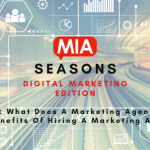We have all heard the phrase content is king and in today’s digital age, content curators and writers are one of the sexiest professions around. However, what does it take to be a good content writer and be churning creative content on a daily basis? In fact, some content curators’ work is so influential, they can actually drive product sales and have a major impact on the success of a brand. To find out more about this creative business, I speak with Olwen van Dijk-Hildebrand, the Head of Content at 2Stallions Digital Marketing Agency.
Hi Olwen! Let’s start the ball rolling by sharing with our readers your professional background, how did you get your stint at 2Stallion Digital Marketing agency and your role in the agency.
Hi Kartina! Thanks for having me, it’s a real pleasure to be on the other side of an interview for a change. I’m a Third Culture Kid, a child who grew up outside of my parental homelands. My father worked for the United Nations, so we moved every four years to a new country, with new schools, new friends, and a new world. This led to my decision to apply to the Australian National University (ANU) in Canberra, Australia where I did my Bachelor of Arts. As many universities do, ANU opened my eyes to the opportunities available in the world. Eventually, I chose to do my Master’s at Monash University in Melbourne.
Why the trip down memory lane?
Content marketing is all about context. After my Master’s degree, I settled in Australia – marrying a local, and in 2012, we bought a local cafe in the Dandenong Hills. This is where I first really dabbled in marketing – running our social media and public relations initiatives; of course, I didn’t think of it as ‘marketing’ back then.
In 2015, we sold the cafe and moved to Malaysia, where I’ve been based now for just over 6 years. So far it’s been an adventure and both my husband and I love it here. In 2016, I landed a job working for a global mystery shopping company, AQ Services International, where I was charged with establishing a marketing department from scratch.
Now, I didn’t have formal training or education in marketing and communication – in 2019-2020 I did eventually do a MicroMasters in my field -, but I felt an instant affinity for it. In a lot of ways, it was something I’d already been doing in some form or another most of my life – storytelling, planning, advertising…After year two, I felt like I had finally come into my own – I had a growing marketing team around me, and I was steadily making strong headway with marketing strategies and communication initiatives. For all the knowledge I gained and the experience I earned, there are always things I never fully excelled at – technical SEO is definitely one of those!
We decided to hire an external SEO (search engine optimization) agency to help boost our digital visibility. Enter 2Stallions Digital Marketing Agency.
I was a client with 2Stallions for nearly three years, and I stayed in friendly contact with the then-directors – Dhawal Shah, Razy Shah, and Daniël Heerkens – after the partnership ended.
Then 2020 happened. I was Senior Communications Manager at AQ when things went south for the entire world.
In the middle of all that global chaos and uncertainty, 2Stallions reached out with a job offer and here I am, Head of Content at a fast-paced, constantly-evolving, boutique digital marketing agency.
Recently, you were among the winners at the Content Marketing Summit Asia Pac Content Moguls 50 for 2021. Tell us in brief about the award and your feelings about being one of the winners.
Winning the Content Moguls 50 is a big deal; something I didn’t think about when I applied for consideration. It wasn’t until I was nominated that I suddenly started to feel excited, and when I won I felt a wave of elation, surprise, pride, and delight. It was an honour to have been nominated, but to actually win…
The strongest feeling I had is probably ‘validation’. It’s an amazing feeling to know that the work you do is valued by leaders in the field. Winning this award gave me context – it provides context for my work in relation to other content marketers – and I’m incredibly grateful and proud.
Olwen, as an experienced content producer, you agree that most times, we have to write in someone else’s voice. What are some of the tips for content writers to be able to do that well?
This is one of the big things about content marketing that newcomers to the field don’t fully grasp. As a content marketer it is our job – our duty, even – to deliver content in the voice and style of the company we’re generating content for. This can be for a variety of clients – if, like me, you work for an agency or are freelancing – or for a single company – if you’re the in-house content marketer.
My first tip in learning how to write in the right ‘voice’ starts with reading a lot in that voice – the first step for most writers and content marketers is mimicry.
That may sound a little contrived, but it’s one of the first things I teach newcomers to the field or any interns that I work with: mimic what’s already been written through osmosis.
Secondly, practice, practice, practice. If you’re new to the company, you’re going to need some practice to familiarize yourself with the tone and voice they use there. That means writing copy again and again and again until you feel like you’ve got it down. Most companies have style guides that will include the kinds of language they prefer, style of grammar that they prefer – in the beginning, this will be your primary source to help you guide you. If your company doesn’t have a style guide, it might be something you want to discuss with the head of your marketing team – if only to ask for hands-on guidance instead.
The third thing I think is important for content writers to accept is that a company’s voice is allowed to change; if you think about a company as a person, you can accept that a person’s voice changes over time – becoming more experienced, adopting the changing nuances of language as language evolves.
How does one approach writing content about a topic of industry that they are not familiar with?
Working at a digital marketing agency is something we run into quite often. Our content team develops and writes content for industries across a variety of industries – from education, finance, to technology. We develop content for B2B and the occasional B2C client, and a lot of it tends to be new and different.
With any content project, whether it’s from an industry you already know about or something completely new, it’s important to talk to the client first. Your client knows everything about their industry, even if you don’t – so it’s up to you to listen to what they’re saying and what they expect. Communication is key.
After that, it’s all about the research. Your content needs to come across as a piece of authority for your client, a thought leadership piece, and that means you need to know your stuff.
Imagine, for a moment, if you were writing a piece of content for a medical client, a hospital for example. You dive in and start writing, but you haven’t done your research and you write about a fact that isn’t correct – not only are you putting your client’s readership at risk by supplying the wrong information, you’re also misrepresenting your client, and that is going to cost you business.
A content writer, especially one who works for clients, shoulders a lot of responsibility and trust, so make sure you do your research and ask for help from the experts – your client! – if you need it.
As a content writer myself, I get this question quite a lot. In your opinion, what is the difference between a copywriter and a content writer?
I get asked this a lot too!
The big difference between content writers and copywriters is their purpose. Copywriters write ‘copy’ – ‘copy ‘ is all about selling, about creating a sense of urgency that drives its reader to a specific, certain action. Whenever you read an advertisement, for example, you’re reading ‘copy’ and it’s produced through copywriting.
Content writers write ‘content’ – content is all about establishing an ongoing relationship with their audience. Content writers look at the big picture and try to create connected content that creates an ongoing narrative. Content writers can be copywriters – it’s a separate skill that needs to be honed and practised, but it’s not all they do.
Besides writing skills, what are some of the other key attributes to becoming a successful content writer?
Be a dedicated reader. To be a successful content writer – or a writer in general – you need to read and read. Read everything you can get your hands on – novels, cookbooks, advertisements, the back of milk cartons… just read! Reading expands your vocabulary and your internalisation of language; when you read, you learn how others use the words you need to expand your horizons.
Be open to new things. Above all things, you should be staying current on the developments in content writing. This means reading things from your peers, reading blogs and social media, and taking part in the conversations! For example, I find LinkedIn to be a great source of information and fruitful conversation about opinion and the ever-changing direction of the world of content.
Learn at least the basics of SEO and Performance Marketing. Content writers work across an entire range of different marketing sectors, so it’s important you know how to get on with all kinds of different skills and the people that wield them. SEO in particular is something every content writer should at least understand – keywords, meta descriptions, and every sentence you write is going to have an impact on SEO ranking so you’ll be working closely with SEO teams over the course of your career. Performance Marketing is all about data, and how it can boost engagement, lead generation, and a whole host of other things. In the same way that it’s important to understand SEO, every content writer should have some basic knowledge of the analytics and metrics that surround their work. Data can help you fine-tune your content, so it’s key to know at least the basics.
Can you share some tips on how one can develop interesting yet compelling content on platforms such as LinkedIn, Facebook and Instagram?
Creating compelling content on social media – no matter the platform – you need to understand the platform a little – different kinds of people populate each platform, and they expect different things from the content they consume on each feed. Once you have some understanding of your potential readers, just make a start.
One of the pitfalls that many content writers face is our desire for perfection – it’s certainly one of my flaws: I love planning out entire content calendars and hate starting something without a full overview of the what, where, and when of a content project, and that includes my own activities on social media.
I was given one piece of advice over and over again by numerous people that helped me overcome that: stop overthinking it, just go with it.
So how do you develop interesting and compelling content on social media? Step one: make a start.
Step two: write what you know, and what you love. Hopefully, the two are aligned and you don’t have to suffer while you write, readers pick up on your emotions! While you write try to answer the questions that your readers will have about your speciality or industry; be helpful.
Step three: keep it simple. People like reading, so make it easy for them to read. ‘Easy’ is a relative term, of course – if you’re writing content for neurosurgery, there’s only so much ‘easy’ you can write.
Step four: keep at it. Your first pieces of content may not get any engagement, that’s alright – keep going, you’ll find what your audience enjoys.
What are some tips for a successful client-agency relationship in ensuring that we meet their content objectives?
Communication! Any successful client-agency relationship starts and ends with good communication. Both you and your client need to be comfortable with asking each other questions, debating and discussing topics.
Communication also allows the agency to set clear targets and manage expectations; some clients think that digital marketing and content marketing is an instant miracle fix for all sorts of issues.
It’s important for any relationship that you layout timelines and roadmaps alongside targets and milestones. It’s vital to make sure that the client has a clear understanding of what content marketing can do for them, what it will take, and how long it may take before they start seeing the results they want. As with all things in life, good things are worth waiting for.
What are the perks of this profession and the downside as well?
If you love writing, this is a great profession for you, but don’t go in blind. Content writing – and by extension content marketing – is not about writing fiction, it’s about constructing a cohesive narrative that tells a brand’s story. If you love storytelling and you can make your storytelling work for someone else, then content writing is something you might like to explore.
One of the things I love about what I do is that I get to work with a variety of clients, and I learn about the ins and outs of a lot of different industries and their stories.
It’s a double-edged sword, though. Diversification means you need to diversify your knowledge too, which takes time and effort. The other challenge comes with writing for someone else; you have to meet their requirements and expectations, and that isn’t for everyone.
What are some great materials or books that you recommend for those who want to make a breakthrough in this profession?
As I mentioned before, beginner content writers or those who would like to delve deeper into this profession should read anything they can get their hands on. If you need somewhere to start, I highly recommend the following reading list:
- Dreyer’s English, Benjamin Dryer
- The Elements of Style, William Strunk Jr.
- Eats, Shoots & Leaves, Lynne Truss
- Purple Cow, Seth Godin
- On Writing, Stephen King
- Art of War, Sun Tzu
- Poetics, Aristotle
- Politics and the English Language, George Orwell
- Copywriting is…, Andrew Boulton
- Start With Why, Finding Your Why, and The Infinite Game, Simon Sinek
In addition, there are some great educational resources online offered by Hubspot’s Academy, Udemy, edX, LinkedIn Learning, and numerous other online courses that can help provide insight and get you started.
Thanks for your insights, Olwen. How can our readers connect with you?
I’m happy to connect with any of your readers via my LinkedIn or via email at olwenvandijk@gmail.com. If it’s about content marketing via the 2Stallions Digital Marketing Agency, then the official channel would have to be via my Agency email at olwen@2stallions.com.














